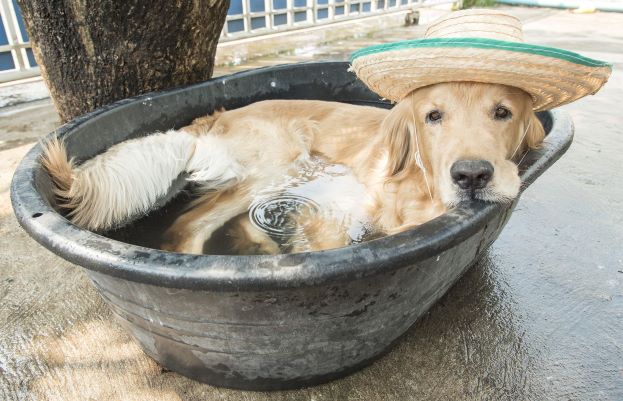Extreme weather care for your pets
Pets are important family members, so it’s important to remember them when things around the home change, whether that be the weather heating up, extreme weather conditions or a large social gathering. Here are some tips of special care for your pet this summer.
Summer
When temperatures exceed 30 degrees, your pets need extra care:
- Keep them cool inside when possible
- Make sure your pets have access to cool clean water at all times, with several water buckets, even a small paddle pool
- Add large ice cubes to your pet’s water or outside area; freeze an ice cream container with water
- Make sure if your pet is outside, they have access to shade
- Don’t walk your dog in the heat of the day, the ground is very hot and could burn their paws – if you cannot walk on it barefoot, they shouldn’t either
- Never leave your pets in a car in the warmer weather. In a matter of minutes, it can result in severe consequences to their wellbeing, or even death!Leave your dog at home, as leaving the car windows down or parking in the shade does little to prevent the increasing temperature inside a vehicle
- Applying sunscreen to your pet is important too, especially for breeds with lighter colour fur. Ask your vet about the right sunscreen for your pet
- It is also a good idea to get your pet a haircut/trim to minimise their hair and heat in the hotter months, using a professional is always best for this.
Celebrations
Celebrations at home or near the home can stress even the easiest going pet. Social events with many people and noises can easily overwhelm pets and many pets find this very distressing. These tips should help your pet through these events:
- In a busy social situation, it’s a good idea to keep your pets separate and happy, with a chew toy, their bedding and food /water
- For noisy celebrations, or fireworks keep a pet in a room with their belongings and some background noise to mask the other noises, i.e. leave a TV or radio on with them
- Do not allow your pet to get excessive attention from children. Make sure you or another responsible person is supervising at all times
- Remember to control those feeding table scraps to your pets during celebrations, parties or BBQ’s. Some of these food scraps can be toxic for dogs
- Make sure pets don’t have access to scraps and rubbish, a pet accidently swallowing alfoil or plastic can be very dangerous.
Fireworks
Many pets find fireworks very distressing, so for this reason it’s good to take these precautions:
- Take your pet for a walk (if possible) before the fireworks start, to tire and calm them
- Keep your pets inside or under shelter when the fireworks are going off
- Ensure your pet has access to their belongings, their bed, blankets, toys and food/water
- Soundproof their environment as much as possible by shutting doors, windows and window coverings
- Provide some background noise, such as the TV or radio to minimise the sounds outside
- Don’t leave your pet alone, keep them company when they are scared
- Don’t pander to your pets fears as this can make it worse, however distract them as much as you can.
Extreme weather
Storms, thunder, lightning and hail can be very distressing for your pet, and there are several things to assist you and your pets in these situations:
- If possible, keep them safe and calm indoors with you or in a secluded safe place in the home such as the laundry with their bed and food/water
- If your pets must stay outside, make sure that your backyard is secure and escape proof and that objects in your backyard are tied down
- Don’t tie up outside pets, they may do more harm to themselves by trying to break free.
Disaster
In the event of a disaster, such as flood, fire or cyclone, if the situation isn’t safe for your family, then it isn’t safe for your pet either.
- Take time to include your pet in your disaster plan, including adequate food and care for them – visit your local SES website for advice on home emergency plans
- At the first sign of a storm or a disaster, bring your pets inside to reduce the risk of them running away due to fear or anxiety
- Have the appropriate mode of transportation prepared and a planned evacuation route in case you need to evacuate
- Have a pet emergency kit or include pet specific items in your family emergency kit
- If necessary, evacuate as early as possible and remember to take your pet with you.
Identification
Make sure your pet is identifiable so in the case of your pet being lost, they can be easily identified and returned to you. They should be registered, microchipped and wearing a pet ID on their collar, and an extra identification tag with your name and contact details will also makes things easier.
If you find a lost pet, contact your state RSPCA and your local Council.
Interested in similar articles? Why not check these out:
Sources:
www.petplan.com.au/blog/dog/emergency-tips/
www.petplan.com.au/blog/horse/safety-around-fireworks/
awl.org.au/advice-education/pet-advice/general-pet-advice-tips











